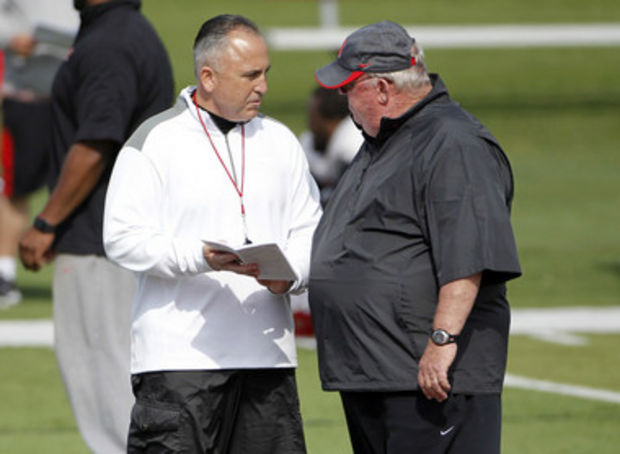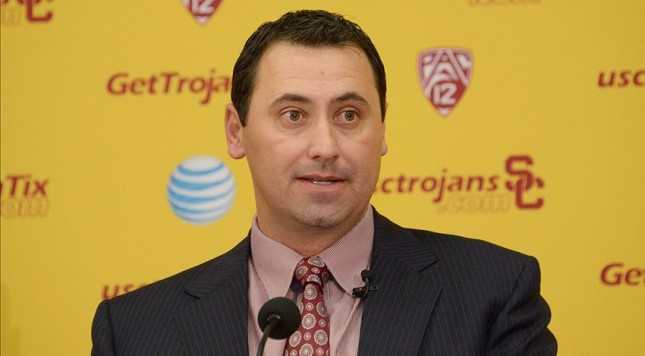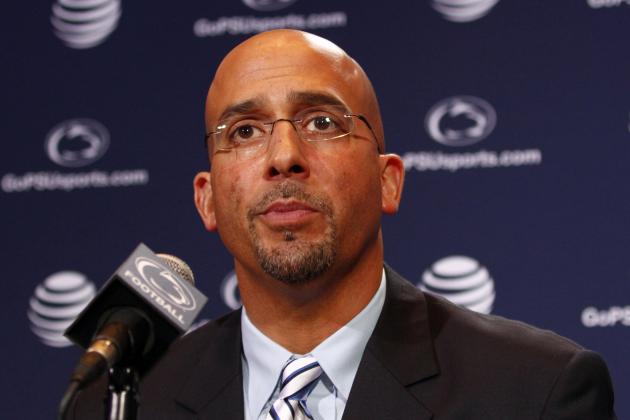Yesterday, in part one of our coaching roundtable here at TSS, we looked specifically at coordinators. Today, we broaden our focus in the realm of coaching. There are still coordinators to talk about, but we’re also interested in examining head coaches, surprising transactions, and the notion of whether fixed principles should be adhered to when an athletic director hires a new head coach.
*
Question No. 1: Which coaching transaction in the past offseason — a hiring or firing, a head coach or coordinator — surprised you the most?
Terry Johnson:
On Twitter @SectionTPJ
While it’s clearly one of the best coaching hires of the offseason, Ralph Friedgen taking over as the offensive coordinator at Rutgers is the biggest surprise to me.
Make no mistake about it: Friedgen is one of the finest minds in football history. An excellent teacher, Friedgen tutored several NFL-bound quarterbacks during his career, including Boomer Esiason and Frank Reich. His offenses thrived at both the college and the professional level, as he guided Georgia Tech to a (split) national championship in 1990, and the San Diego Chargers to a surprise trip to the Super Bowl in 1995.
So, why is this move such a shocker?
Simple: Friedgen was also an excellent head coach. Sure, Maryland had some losing seasons under his watch, but the Terrapins won 9 or more games five times during his tenure, and posted a very respectable 5-2 bowl record.
In other words: I’m not surprised that he’s back in the game. I just find it strange that no one offered him a head coaching job since he involuntarily left Maryland back in 2010.

It would be sweetly and deliciously ironic for Rutgers fans if the Scarlet Knights thrive in the Big Ten as a result of contributions made by Maryland’s former head coach, Ralph Friedgen. If he polishes Rutgers’s passing game, that could happen.
Bart Doan:
On Twitter @TheCoachBart
Anyone who’s been married, is married, or has lived with a woman has been through this: the unnecessary movement of furniture seemingly for the sake of just moving furniture. You know the story … you come home one day and sit down on the couch and suddenly the couch isn’t there and your bottom is on a coffee table and you ask yourself, “WHY!??! JUST … WHY!?!?”, and the woman says, “I just needed a change.”
Not saying it’s good or bad, but that feels like Willie Fritz leaving Sam Houston State for Georgia Southern and their impending move to FBS level. The tough sledding elite FCS coaches find in getting FBS jobs has always befuddled me, but man, this one seems like he just wanted couches moved so they were gonna get moved one way or another.
Sam Houston State wasn’t exactly on the fritz either (I promise, I’ll stop after this), Willie having gone 40-15 there and recently with back-to-back FCS title game appearances. Georgia Southern faces a very long-term build at the FBS level as all programs do, and while Fritz has long deserved a shot at the highest level, this seems like as rough of a situation as one was going to move up for. That said, great hire by GSU, poaching a top-shelf coach from the level the program is leaving. And heck, maybe the curve won’t be as dire as I act like. After all, the Eagles probably wouldn’t have finished last in the SEC East in 2013 (you’re welcome for the mention, #FSUTwitter).
Matt Zemek:
On Twitter @SectionMZ
Louisville really went there.
I know, I know — nothing should surprise anyone anymore. We’re supposed to be past the capacity to be surprised in this era of human history. Yes, this is an entertainment business, too. Yes, wins are the currency athletic directors seek in exchange for the dollars they shower upon coaches. Yes, Louisville needed a talented head coach heading into its first year of ACC competition.
Yet, the Cardinals went there. They really, actually, genuinely hired Bobby Petrino for the second time, after the Jessica Dorrell affair (and much more than said affair).
Louisville could have hired Chad Morris away from Clemson to not only get a first-rate playcaller, but someone without Petrino’s baggage. The hire would have carried the added plus of giving Louisville an instant scouting report on a key division rival in the ACC Atlantic. Morris could have been “Offense Guy,” and he could have hired an elite defensive coordinator, someone much better than Todd Grantham.
Yes, Petrino is one of the five best play-callers in college football. He’s that good. Yet, Louisville could have crafted an alternative and not given one of the sleaziest figures in the sport a second chance he did not — and does not — deserve.
One final reminder: Petrino’s worst offense at Arkansas was NOT the affair itself. It was his interference in a hiring process (for the position Dorrell ultimately attained), a major part of his active efforts to disrupt and uproot an entire athletic department at a state school. SOME wrongdoings in life (and college sports) should carry a few consequences. I was dumb enough to think that Tom Jurich had at least a few standards himself.
Nope.
Question No. 2: A two-parter:
A) Which program had the greatest opportunity to help itself when a coaching vacancy opened this past offseason, but failed to do so?
B) Which program suffered a terrible blow or fell into a difficult situation but then rescued itself by getting the right coach or the right coordinator (or both)?
Bart Doan:
In response to A: Alabama
Throughout the nine seasons of Seinfeld, for about 100 percent of the time, George Costanza dates up. For being a short, stocky, slow witted bald man (not exactly what women probably put into Match.com or whatever people use for that sort of thing as their preferred type), he routinely is with women that in real life probably wouldn’t be seen with a guy of such stature.
Essentially, Lane Kiffin is the Costanza of coaching jobs. Inexplicably almost, and with some people hiring him that have seriously stellar track records, Kiffin continues to get job after job at the top of the food chain that makes no sense. Alabama is a flat-out diamond mine for coaches, a sure-fire segue to a big time head coaching job just by being around there.
Alabama probably could have pointed at any OC in the country not at maybe your standard power programs and gotten that guy to come aboard. So … Lane Kiffin, who has failed spectacularly in stints with the NFL’s Raiders, USC, and really Tennessee from a PR standpoint?
Kiffin’s major career success came as the offensive coordinator of USC, where the Trojans went 23-3 in his time at the position. Impressive, but look at the haul of talent on those teams and also understand they were coached by Pete Carroll, who has to be on the shorter list of some of the greatest football minds of the modern era. Kiffin has said that he’s learned from his mistakes. I guess that’s a good place to start. But for a program that basically walks around with a blank check book at the mall, you figure a different hire would have been made.
In response to B: Penn State
When I first read this question I said, “Damn, couldn’t we have just said ‘what do you think of Penn State?’”, but then I look down and see that no one answered the same as me, so either that means you’re a visionary or an idiot. Please don’t tweet your opinion on said question.
Bill O’Brien did a remarkable job at PSU during his very brief two years there, ushering in a new identity to a program starved for positivity that had been gutted both by morale and defections. O’Brien convinced all-world quarterback Christian Hackenberg to come on campus, solidifying the most important position in the game for at least three years, and PSU kept winning games. How would the Nittany Lions recover from losing what looked like an ideal hire after only two seasons?
Oh, you know, go get a guy with a ton of bravado that turned around Vanderbilt football into a winner in the SEC. James Franklin for my money was the best hire of the offseason anywhere. That means, if, like, IBM or Yahoo! named a new CEO, it still wasn’t as good as James Franklin (*computer shuts down, bursts into flames*).
Amid constant ongoing lawsuits and sanctions that will eventually be very difficult to deal with from a depth perspective, PSU continues to be a desired place for players and coaches. Franklin knows the area, can coach, and can do it in impossible situations. Penn State is hardly impossible. He hangs around a while … you go ahead and look out.
Matt Zemek:
In response to A: USC.
Yes, the energy around the USC program is and has been quite positive this summer. Steve Sarkisian is well on his way to recruiting at a high level. Early signs are encouraging in Los Angeles, where Sark is putting the Trojans on solid footing.
However…
Sarkisian had more than enough time to develop Washington into an appreciably better program, and he never did turn the corner with the Huskies. The 2013 season started brightly, but the magnitude of the season-opening win over Boise State — and a fellow named Chris Petersen, who subsequently became Washington’s new head coach a few months later — was diminished by the fact that Boise State was no longer “Boise State.” All the positive signs that emerged in the first half of the 2013 season evaporated in the second half, especially in a blowout loss at Arizona State which signaled that Sark’s tenure in Seattle remained stuck in the muck.
The verdict here is that Sarkisian just isn’t much of a ball coach. He’ll get his chance to prove the doubters wrong at USC… but there’s more than a little reason to be skeptical of him at this point.
In response to B: Boise State.
Bronco fans had long been worried about Chris Petersen’s desire to scratch the proverbial itch and seek a bigger gig. That moment finally occurred late last autumn, so Boise State needed a coach who could steer the program through that much-feared transition. Getting an offense-first coach was one thing the program needed. Getting Petersen’s former offensive coordinator — the man who helped win two Fiesta Bowls alongside “Coach Pete” — mattered even more. That last reality should make Bronco Nation feel so much more comfortable in 2014 and beyond. This was a much better hire than the others Boise State could have made.
Terry Johnson:
I really don’t know that I like the first question. Until someone’s actually coached in a game, it doesn’t seem right to say that a school didn’t help itself with the hire that it made.
With that disclaimer in mind, I’ll say USC. While Sarkisian may transform the Trojans into the powerhouse program that it was under Pete Carroll, his resume at Washington was less than impressive considering the amount of talent he had at his disposal. Given that USC is one of the ten best coaching gigs in the country today, the school should have gone after someone with a proven record of success, rather than a coach with just one good season.
As for the answer to the second question, I’ll go with Mark Richt’s hiring of Jeremy Pruitt. Despite having a roster loaded with next-level talent, Georgia’s defense failed to live up to its potential under Todd Grantham. Over the last two seasons, the Dawgs haven’t gotten the job done against ranked opponents, allowing 5.91 yards per play and over 418 yards per contest. Things bottomed out last year, as UGA finished 8th in the SEC in total defense.
Pruitt will change all that. A critical member of Alabama’s defensive staff under Nick Saban from 2010-2012, Pruitt took over Florida State’s D and transformed it into one of the best defenses in college football. For the season, the Seminoles ranked first nationally in scoring defense (12.1 ppg), first in interceptions (26 with 5 pick 6’s), and second in yards per play (4.09).
It’s tough to argue with those results.
*
Question No. 3: Should all head coaches get at least two years at a program if they do not bring scandal or a significant level of unwanted off-field attention to their places of employment?
Matt Zemek:
It’s true that poor Ellis Johnson was in over his head at Southern Mississippi in 2012, and that the Golden Eagles probably would have been a complete and utter mess once again in 2013. Yet, I’m sorry — if you, as an athletic director, are unwise enough to make a terrible hire, you live with that hire for two years, barring off-field scandals or humiliations that affect your school. The list of coaches who have suffered terrible first seasons on the job and then repaired their situations in year two is — if not a long list — certainly not a tiny one, to be sure. A four-year stay at a school ushers a coach to the point where he is working with his own recruiting players by the end of that cycle. Two seasons is mighty small compared to four or even three. It’s not very long when seen in a fuller context. Even if the school is Alabama or Texas or USC, you don’t fire a scandal-free coach after only one season. This isn’t the world we live in, but gosh sakes alive, it’s the world we ought to want.
Terry Johnson:
I will state my position on this subject with a phrase software developers use all the time: you cannot put nine women in a room and expect to have a baby in one month.
As silly as that statement sounds, it makes a very important point in that throwing money and resources at a problem doesn’t guarantee a quick fix. In order to build a program the right way, it’s going to take time.
Coaching is no different. While there are exceptions (see: Gus Malzahn), implementing a new scheme isn’t something that can be done overnight. It usually takes a season or two, to recruit the right players to run the new system(s).
Sadly, not everyone understands this principle. In the past few years, both Turner Gill (Kansas) and Jon Embree (Colorado) got the boot after just two seasons on the job. These firings trouble me because each coach walked into a terrible situation, and weren’t given the time to set things right.
Compare and contrast that with how Virginia Tech handled Frank Beamer. The year before Beamer arrived, Coach Bill Dooley led the Hokies to a 10-1-1 record highlighted a Peach Bowl win over N.C. State. Beamer went 2-9 in his initial campaign, followed by another 3-8 record in year two. However, rather than fire him, Tech gave him time to build the program the right way.
We all know well that turned out. By 1993, Beamer Ball had become an iconic brand of football marked by a power running game, hard-nosed defense, and solid special teams play. The Hokies have been to a bowl game every year since then, including eight major bowls, and an appearance in the national championship game.
Remember that, athletic directors: patience and hard work ALWAYS pay off.
Bart Doan:
I think both people who consistently read my writing know exactly where I’m going with this. Never a fan of coaching fires, and never a fan of firings in particular without giving a person a chance to work out. This is the ole “got married and broke up with the wife on the honeymoon” sort of thing. People lack patience anymore regarding anything. Everything has to be here, now, and successful immediately. Joe Flacco or Andrew Luck or Robert Griffin III succeed right out of the gate and suddenly all rookie QBs are supposed to when really, 10-15 years ago, that was absurd to think.
Ditto for coaches. People expect wins now, not accounting for how hard the job is, the hours put in, and the total culture change that usually comes along with taking over a program, because most programs don’t change coaching hands because everything is going swimmingly.
That said, there’s always something behind the scenes that never comes to light in these situations. “Pure wins and losses” deserves a few years to be sorted out. Tap the breaks, have patience, and allow things the opportunity to work out. If patience is really a virtue, sports is severely lacking said virtue.


